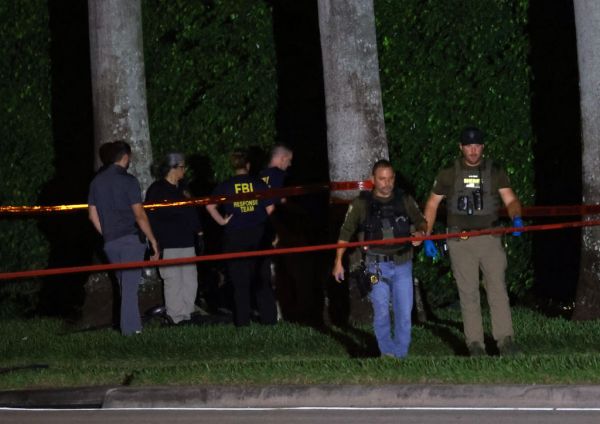Happy Monday! Election Day is 50 days away. After he admitted to dumping a dead bear cub in New York City’s Central Park, former independent presidential candidate Robert F. Kennedy Jr. has revealed that he is under investigation for chainsawing the head off a dead whale decades ago.
Up to Speed
- Vice President Kamala Harris on Friday participated in her second sit-down interview since jumping into the presidential race, speaking one-on-one with Philadelphia’s ABC affiliate. Harris fielded questions on her economic policies and how she would differ as president from Joe Biden, calling for increasing the tax deduction for those who want to start a small business from $5,000 to $50,000 and giving first-time homebuyers $25,000 to help with a down payment. In response to a question about how she differed from Biden, she cited her proposal to increase the child tax credit to $6,000.
- Harris will meet with the International Brotherhood of Teamsters Monday to court the union’s endorsement, Politico reported. The visit comes after Teamsters President Sean O’Brien spoke to the Republican National Convention, though he later accused Donald Trump of “economic terrorism” after the former president spoke approvingly of firing striking workers in an interview with X owner Elon Musk. Several other prominent labor unions have thrown their support behind Harris, with their leaders appearing at the Democratic National Convention.
- Rep. Jamie Raskin, ranking member of the House Committee on Oversight and Accountability, in a Sunday Axios report hinted at what investigations he would conduct if Democrats win the House of Representatives this fall. In addition to policy topics such gun control, climate change, and Supreme Court ethics, the committee under Democratic leadership would also likely look into the business dealings of Jared Kushner, Trump’s son-in-law, as well as the operations of Trump’s businesses while he was in the White House.
Rhetoric Heats Up After Second Trump Assassination Attempt

The FBI is investigating what appears to be the second assassination attempt on Donald Trump this year. On Sunday afternoon, U.S. Secret Service officers opened fire on a man who they said was pointing a rifle through a fence into Trump’s golf club in West Palm Beach, Florida, the Associated Press reports. Trump was playing golf and was only about 400 yards away from where members of his Secret Service detail spotted the suspect, who did not appear to fire his weapon and was later apprehended by law enforcement.
The suspect is Ryan Wesley Routh, a 58-year-old former roofing contractor from North Carolina who seems to be strongly opposed to Trump and had illusions about playing a major role in the war in Ukraine. Routh appears to be something of a political wanderer, judging by his now suspended account on X, though his self-published book makes clear he views Trump as a threat to American democracy after having previously supported him.
Trump was unharmed but left the course and returned to his Palm Beach home, Mar-a-Lago. There he spoke with allies on the phone, including Sen. Lindsey Graham, who tweeted that the reportedly upbeat Trump was in “good spirits.” Members of both parties, including Harris and President Joe Biden, quickly issued statements expressing relief that Trump was not hurt and denouncing political violence. On Monday, Biden told reporters the Secret Service needs “more help.”
Florida’s Republican governor, Ron DeSantis, announced the state would be conducting its own investigation into the assassination attempt. And Trump himself eventually issued a statement on his Truth Social account late Sunday night thanking others for their “concern and well wishes.”
While the investigation continues—and questions arise about how a second gunman was able to get so close to Trump, especially after the July attempt on his life in Pennsylvania—Trump’s allies are warning that the rhetoric from the Republican nominee’s critics are increasing the risk of even more political violence as Election Day approaches. They’re also fanning the flames by alleging, without evidence, that there is an organized effort to kill the former president.
“This is very unlikely to be the last time they try to kill Trump,” tweeted Rep. Marjorie Taylor Greene of Georgia on Monday morning. “I do not believe these are lone wolves - crazy people - mad at him because of his ‘rhetoric’ like they want us to believe.”
Sen. Mike Lee of Utah tweeted Sunday that the “left wants [Trump] dead” and later demanded cable network MSNBC “tone down the rhetoric.” He also said that “We can’t trust the feds” to investigate what happened and encouraged DeSantis’ separate investigation. Similarly, Erik Prince, the GOP donor and founder of the private military contractor Blackwater, praised DeSantis and even offered advice.
Some Republicans pointed to comments from Democrats and others that Trump is a threat to democracy as directly responsible for the radicalization of people who might try to cause Trump harm.
“This rhetoric against President Trump, this narrative that he will be the next dictator, that he is the next Hitler coming, it has got to stop. Enough is enough,” Florida Rep. Mike Waltz told Fox News on Sunday. Waltz noted reports that Iran was seeking to assassinate Trump.
“And when you have this narrative coming from the left, from media, from elected officials, even, that Trump has to be stopped by any means necessary, it shouldn’t surprise anyone that these people are being radicalized and taking action like this,” he added.
Trump supporters in the broader MAGA media ecosystem responded to the incident with similar outrage over Democratic rhetoric.
“Calls to violence that are regularly platformed against Trump and republicans by these networks must be banned,” tweeted Benny Johnson, a right-wing online broadcaster. “NOW is the time for a reckoning with the irresponsible and bloodthirsty DNC activists in the media.”
And Dan Bongino, a former Secret Service agent who has warned that there will be more attempts on Trump’s life, tweeted this on Monday: “The only ‘threat to democracy’ in this country is originating from the increasingly violent and radical left, and their media sycophants.
The receipts are EVERYWHERE.”
And Eric Metaxas, a prominent writer on the right, urged Trump to “turn the rhetoric UP” in response to the latest attempt to take his life. “Trump should unleash the righteous fury of every patriot's voice in his speeches, as should everyone on his team. We will not be silent. Fight,” Metaxas tweeted.
The threat of political violence remains, and not just toward Trump. Elon Musk, the billionaire who owns X, tweeted and later deleted a snarky response to Sunday’s news that “no one is even trying to assassinate Biden/Kamala.” (Musk later suggested his tweet was a “joke.”) And the Libertarian Party of New Hampshire also deleted a tweet from its official account that stated “Anyone who murders Kamala Harris would be an American hero.”
What remains to be seen is if Democrats and liberals will adjust their rhetoric to downplay their most strident criticisms of Trump. After the first assassination attempt in July, when a gunman actually fired directly at the former president and grazed his ear, much of the politicking from Democrats slowed down. But once the Republican National Convention took place the next week—during which Trump and the GOP maintained their own charged attacks on Democrats—and Biden withdrew from the race, the contours of political rhetoric have largely returned to form, with both sides accusing the other of threatening the health and future of the country.
In last week’s debate, for instance, Harris criticized Trump for his threats to weaponize the Justice Department against his political enemies. “Understand what it would mean for Donald Trump to be back in the White House with no guardrails,” she had said. “Because certainly we know, now the court won’t stop him, we know J.D. Vance is not going to stop him. It’s up to the American people to stop him.”
“I probably took a bullet to the head because of the things they say about me,” Trump had retorted. “They talk about democracy, I’m a threat to democracy. They’re the threat to democracy.”
Speaking with Fox News on Monday, Trump repeated the idea that Democrats were to blame for this latest assassination attempt.
“He believed the rhetoric of Biden and Harris, and he acted on it,” Trump said of Routh, the suspect. “Their rhetoric is causing me to be shot at, when I am the one who is going to save the country, and they are the ones that are destroying the country—both from the inside and out.”
Trump criticized Harris for claiming the mantle of a unity candidate. “They are the opposite,” he told Fox News. “These are people that want to destroy our country.”
Then, the man who had just decried the use of overheated rhetoric directed at political opponents, added ominously: “It is called the enemy from within. They are the real threat.”
Kamala Harris Woos Disaffected Arizona Republicans

Boasting some impressive Republican endorsements, Kamala Harris is executing a robust campaign aimed at wooing persuadable GOP voters and spurring them to the polls.
In Arizona, this element of the vice president’s broader strategy to defeat Donald Trump is a crucial component of her effort to score a come-from-behind victory over the Republican nominee, who has consistently led in surveys of the Southwestern battleground state. So, beyond Harris’ eye-catching Republican endorsements—national figures like former Vice President Dick Cheney and local figures like Mesa Mayor John Giles—is a micro campaign operation dedicated to turning existing GOP disappointment with Trump into votes for the vice president.
“The Arizona outreach to disaffected Republicans may be one of the best in the entire country by the Harris campaign,” said Barret Marson, a Republican operative in Phoenix who is unaffiliated with the effort.
Just how competitive is Arizona? President Joe Biden defeated Trump in the Grand Canyon State in 2020 by just 10,457 votes—0.4 percentage points. Harris has made up ground in Arizona since replacing Biden as the Democratic standard bearer but still trails Trump by an average of 48.6 percent to 47.3 percent, a margin of 1.3 points. To flip the script by the time the polls close November 5, the Harris campaign is looking for significant crossover votes from registered Republicans.
The foundation of Harris’ effort is built on the deployment of more than 150 paid staff and 38,000-plus volunteers in 16 field offices across Arizona, the Harris campaign told us. That includes outposts in rural, ruby-red counties like Cochise and Mohave, where Trump defeated Biden by nearly 20 points and more than 50 points, respectively.
Registered Republicans and conservative-leaning independents are among the voting blocs being targeted with door knocking, phone calls, and text messaging—in the suburbs where support for Trump often wanes but also in exurban and rural areas where the former president’s numbers remain strong. Prominent Democrats are playing a role: Gwen Walz, wife of Harris’ running mate, Minnesota Gov. Tim Walz, was scheduled Monday to campaign in Kingman, Arizona, a community in Mohave County. The vice president’s Republican validators are figuring perhaps even more prominently, with Arizona and national Republicans backing her campaign regularly making the rounds in-state.
To headline a Harris campaign debate-watch party in Phoenix last week, the campaign sent in Joe Walsh, the Republican former congressman from Illinois who is traveling to various battleground states to encourage Republicans to vote for the Democratic nominee.
“There are a lot of Republicans on the ground in these states telling me they will support her but won’t say it publicly,” Walsh, a longtime Trump critic, told Dispatch Politics. Walsh explained that he and other Republican validators like him are acting as important “permission slips” for GOP voters who are considering opposing the 45th president but feel uneasy about supporting a Democrat—any Democrat.
The Harris campaign says advertising specifically targeting Republicans and other like-minded voters is forthcoming. The tens of millions of voters who pulled the lever for Nikki Haley in the 2024 Republican primaries can expect to be on the receiving end of this eventual ad campaign. In Arizona, Haley captured nearly 18 percent of the vote (nearly 111,000 votes) while coming in second in the primary to Trump. Four years ago, he lost Arizona by roughly one-tenth of that vote total.
Wes Gullet, who once worked as Sen. John McCain’s state director, said he is finding an openness to voting for Harris among business-minded Republicans and those who associate themselves with the Ronald Reagan wing of the party. The riot at the Capitol on January 6, 2021, looms large as these voters ponder whom to support this fall, as do Trump’s unorthodox positions rooted in conservative populism and their belief that he might ignore the Constitution if elected to a second term.
These Republicans are not born-again Democrats or philosophical liberals, Gullet emphasized. “I talked to a guy the other day at a breakfast who told me he doesn’t feel like [he has] a political home,” he said. Those voters “are the kinds of people we’re talking to,” he added.
Sam Campana, the former Republican mayor of Scottsdale, has supported Democrats from time to time over the years. She told Dispatch Politics she has experienced a positive, energetic response from disaffected Republicans as she stumps for Harris. “I’ve never seen anything like it,” she said.
Even as Trump maintains an edge in Arizona, there are some possible reasons for Harris’ crossover appeal there, namely McCain and Kari Lake, the failed gubernatorial candidate who is now the GOP nominee for Senate in Arizona.
McCain, who died in 2018 while serving in his sixth term in the Senate, is still a beloved figure in the state with voters of all political stripes (although less so with Trump-aligned populists). The former president’s ongoing feud with the late senator remains a sticking point with some voters. Accordingly, it was big news locally when McCain’s son, Jimmy McCain, endorsed Harris unprompted and offered to help the vice president in her bid to win the state’s 11 Electoral College votes.
Lake’s hostility to McCain seems at times even more pronounced than Trump’s. Plus, the Trump ally’s constant presence on the campaign trail over the past four years serves as a glaring reminder of the sort of GOP politics causing many disaffected Republicans to mull voting for Harris in the first place. Lake never conceded defeat in the 2022 race for governor and insists it was stolen.
“We’re not asking people to register as Democrats. We’re Republicans,” Campana explained. “So, we invoke McCain’s name and we say: ‘That’s the party we want but it’s not here right now … We need to vote for someone who can give us the time to go back and rebuild our party and recapture our Republican values.”
Eyes on the Trail
- It’s a day off the trail for both presidential candidates, with Kamala Harris meeting with the Teamsters today and traveling to Philadelphia Tuesday for an interview with members of the National Association of Black Journalists. Donald Trump, meanwhile, will hold a rally in Flint, Michigan, on Tuesday.
- Sen. J.D. Vance on Tuesday will deliver remarks in Sparta, Michigan, and Eau Claire, Wisconsin, and in Raleigh, North Carolina, on Wednesday.
- Gov. Tim Walz will arrive in Macon, Georgia, tonight and will deliver remarks there on Tuesday before participating in political events in Atlanta. He will then go to Asheville, North Carolina, where he will hold a rally in the afternoon.
- Walz’s wife, Gwen Walz, was scheduled to stump for the Harris-Walz ticket on Monday afternoon in Kingman, Arizona, per the campaign.
Sunday Show Rewind
- Republican vice presidential nominee Sen. J.D. Vance appeared on multiple Sunday shows where he answered for his and former President Donald Trump’s spreading unsubstantiated claims about Haitian immigrants in Springfield, Ohio, eating pets. On CNN’s State of the Union, anchor Dana Bash brought up the city’s mayor condemning the words of “federal politicians” as bomb threats hit the city. “You just accused me of inciting violence against a community when all that I’ve done is surface the complaints of my constituents, people who are suffering because of Kamala Harris’ policies,” Vance said to Bash. “Are we not allowed to talk about these problems because some psychopaths are threatening violence?”
- However, pressed on the truth of his and Trump’s claims of immigrants eating animals, Vance cited reports from constituents and said he was “creating a story,” that is, bringing media attention to real problems he says have so far been ignored. “The American media totally ignored this stuff until Donald Trump and I started talking about cat memes,” he said. “If I have to create stories so that the American media actually pays attention to the suffering of the American people, then that’s what I’m going to do.”
- In an appearance on Meet the Press, Vance elaborated on his reasoning for echoing constituents’ claims about the allegations of eating animals. “I have heard first hand from multiple constituents, people who made 911 calls a month ago, a year ago, who are making these complaints,” he said. “I trust my constituents more than I do the American media that has shown no interest in what’s happened in Springfield until we started sharing cat memes on the internet.”
- But Ohio Gov. Mike DeWine on ABC’s This Week rebutted the claims, saying there was “absolutely not” any evidence that the Haitian immigrants are eating pets. While he acknowledged the influx of immigrants has brought challenges, he defended the Haitian community in the city. “When you look at all of these things, people who want to work, people who value their kids, who value education,” he told the network’s Martha Raddatz. “These are positive influences on our community in Springfield, and any comment about that otherwise, I think, is hurtful and is not helpful to the city of Springfield.”
- Asked what he had done to help DeWine after the governor’s request for federal help on CBS’ Face the Nation, Vance cited his speaking out about border security. “The most important thing that we can do to assist Gov. DeWine and the whole state of Ohio, and, frankly, the whole country, Margaret, is to stop Kamala Harris’ open border, and for two years, I’ve been fighting for policies that do exactly that,” he told anchor Margaret Brennan.
Notable and Quotable
“I probably wouldn’t tell them anything because usually it would be maybe a personality problem. Maybe they don’t like the way I was tough on China. You know, a lot of them don’t want me to be tough on China. A lot of them don’t want me to be tough on anybody because they’re taken care of by people.”
—Former President Donald Trump, responding to a question from a Las Vegas television news reporter about what he’d say to persuade a Republican considering voting for Harris to vote for him instead, September 14, 2024








Please note that we at The Dispatch hold ourselves, our work, and our commenters to a higher standard than other places on the internet. We welcome comments that foster genuine debate or discussion—including comments critical of us or our work—but responses that include ad hominem attacks on fellow Dispatch members or are intended to stoke fear and anger may be moderated.
With your membership, you only have the ability to comment on The Morning Dispatch articles. Consider upgrading to join the conversation everywhere.